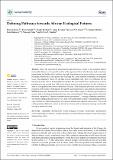Files in this item
Defining pathways towards african ecological futures
Item metadata
| dc.contributor.author | Scheren, Peter | |
| dc.contributor.author | Tyrrell, Peter | |
| dc.contributor.author | Brehony, Peadar | |
| dc.contributor.author | Allan, James R. | |
| dc.contributor.author | Thorn, Jessica | |
| dc.contributor.author | Chinho, Tendai | |
| dc.contributor.author | Katerere, Yemi | |
| dc.contributor.author | Ushie, Vanessa | |
| dc.contributor.author | Worden, Jeffrey S. | |
| dc.date.accessioned | 2022-02-08T15:31:23Z | |
| dc.date.available | 2022-02-08T15:31:23Z | |
| dc.date.issued | 2021-08-09 | |
| dc.identifier | 277723890 | |
| dc.identifier | bfa6b396-1ab1-4821-9ed4-3a36a243e12c | |
| dc.identifier | 85112447762 | |
| dc.identifier.citation | Scheren , P , Tyrrell , P , Brehony , P , Allan , J R , Thorn , J , Chinho , T , Katerere , Y , Ushie , V & Worden , J S 2021 , ' Defining pathways towards african ecological futures ' , Sustainability , vol. 13 , no. 16 , 8894 . https://doi.org/10.3390/su13168894 | en |
| dc.identifier.issn | 2071-1050 | |
| dc.identifier.other | RIS: urn:E15DE235C1DB6C20FB93F5F82546F672 | |
| dc.identifier.other | ORCID: /0000-0003-2108-2554/work/117568970 | |
| dc.identifier.uri | https://hdl.handle.net/10023/24824 | |
| dc.description | This work was funded by African Development Bank, the Worldwide Fund for Nature. Recent work was also funded in part by the UK Research and Innovation’s Global Challenges Research Fund under the Development Corridors Partnership (grant no. ES/P011500/1). | en |
| dc.description.abstract | Africa has experienced unprecedented growth across a range of development indices for decades. However, this growth is often at the expense of Africa’s biodiversity and ecosystems, jeopardizing the livelihoods of millions of people depending on the goods and services provided by nature, with broader consequences for achieving the United Nations Sustainable Development Goals. Encouragingly, Africa can still take a more sustainable path. Here, we synthesize the key learnings from the African Ecological Futures project. We report results from a participatory scenario planning process around four collectively-owned scenarios and narratives for the evolution of Africa’s ecological resource base over the next 50 years. These scenarios provided a lens to review pressures on the natural environment, through the drivers, pressures, state, impacts, and responses (DPSIR) framework. Based on the outcomes from each of these steps, we discuss opportunities to reorient Africa’s development trajectories towards a sustainable path. These opportunities fall under the broad categories of “effective natural resource governance”, “strategic planning capabilities”, “investment safeguards and frameworks”, and “new partnership models”. Underpinning all these opportunities are “data, management information, and decision support frameworks”. This work can help inform collaborative action by a broad set of actors with an interest in ensuring a sustainable ecological future for Africa. | |
| dc.format.extent | 21 | |
| dc.format.extent | 1603357 | |
| dc.language.iso | eng | |
| dc.relation.ispartof | Sustainability | en |
| dc.subject | Africa | en |
| dc.subject | Biodiversity | en |
| dc.subject | Decision support frameworks | en |
| dc.subject | Governance | en |
| dc.subject | Green infrastructure | en |
| dc.subject | Investment | en |
| dc.subject | Participatory scenario planning | en |
| dc.subject | Social–ecological systems | en |
| dc.subject | Strategic planning | en |
| dc.subject | Sustainable development | en |
| dc.subject | GE Environmental Sciences | en |
| dc.subject | 3rd-DAS | en |
| dc.subject.lcc | GE | en |
| dc.title | Defining pathways towards african ecological futures | en |
| dc.type | Journal article | en |
| dc.contributor.institution | University of St Andrews. School of Geography & Sustainable Development | en |
| dc.identifier.doi | https://doi.org/10.3390/su13168894 | |
| dc.description.status | Peer reviewed | en |
This item appears in the following Collection(s)
Items in the St Andrews Research Repository are protected by copyright, with all rights reserved, unless otherwise indicated.

